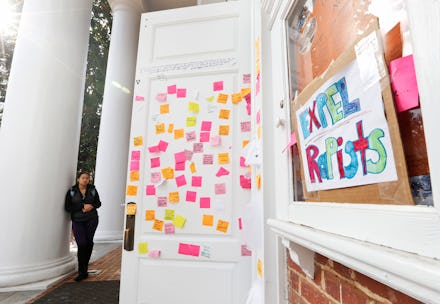Here's What We Really Should Be Talking About When We Talk About the UVA Rape Story

When the Washington Post exposed discrepancies in Rolling Stone's report on the alleged gang rape of a University of Virginia student named Jackie, it quickly became clear that the faulty reporting's impact would be far-reaching.
Not only has it raised concerns about journalistic standards for reporting on rape, it may very well "have a damaging impact in how the college campuses and other institutions view and handle sexual assault," as Mic has previously reported.
It's no surprise that the inconsistencies in Jackie's story have fueled a whole new chorus of rape deniers and online trolls who relish in propagating rape culture. One Twitter user went so far as to try to publicly release her personal contact information, setting off a torrent of misogynistic tweets openly mocking rape victims.
Amid the growing controversy, many feminists have come together to remind the broader online community that supporting survivors of sexual assault may be even more important now than it was before the Rolling Stone piece came out. The #IStandWithJackie hashtag has become a gathering place for these tweets, as men and women have taken to Twitter to offer personal stories of solidarity as well as to simply acknowledge the hardships that victims face in the aftermath of an assault and reiterate the need to believe survivors.
These tweets highlight the need to, at the very least, listen to survivors. Yes, Jackie's story and the ensuing Rolling Stone fiasco are problematic for several reasons, from inconsistencies in Jackie's story to the magazine allegedly denying her request to be removed from the article (a violation of ethical guidelines for journalists reporting on rape), to fact-checking missteps and backpedaling apologies. The facts are from certain in what has become a very complicated case, but the answer cannot be to simply dismiss her trauma. To do so is overly simplistic and very problematic.
The controversy surrounding the Rolling Stone piece worries victims' advocates, and for good reason. Nearly 1 in 5 female university students report being the victims of rape or attempted rape, and more than 1/4 of victims say their assailant was a fraternity member, according to Mother Jones. What's more, only 4% of college sexual assault victims report their assaults.
Indeed, reporting a sexual assault is no easy task, which is why rape is one of the most underreported crimes nationally. According to RAINN, 54% of rapes go unreported to the authorities. And for those overly concerned with the comparatively small percent of rapes ultimately determined to be "false reports" — 2% to 8% — it's worth noting that "often, a report of sexual assault is determined to be 'false' because the alleged victim fails to name an attacker out of fear of retribution or because police are unable to corroborate certain details of the attack."
Despite these statistics, as ThinkProgress notes, "the public remains far more skeptical of rape than of other crimes."
In a time when the institutional and cultural hurdles survivors face are all too often compounded by Internet threats and harassment, #IStandWithJackie serves as an important beacon of online support for survivors. It is essential that journalists and activists alike make sure they have their own facts straight when reporting on sexual assault, lest their mistakes be used to discredit the larger cause. But rape deniers shouldn't have the ultimate say; every survivor deserves to have his or her story heard and respected.